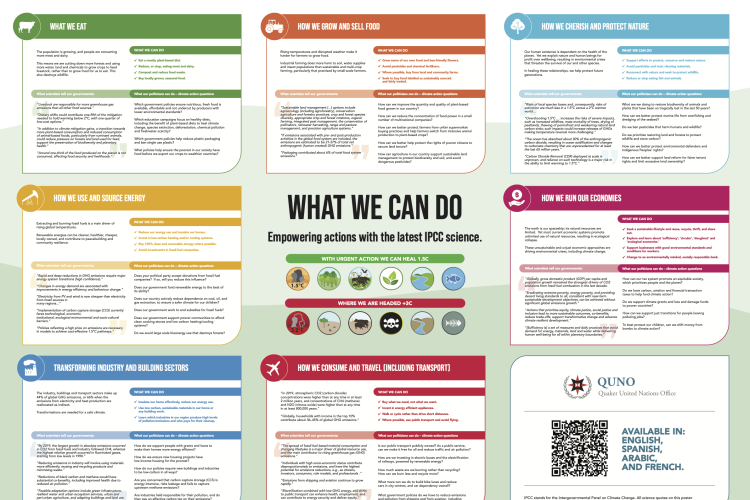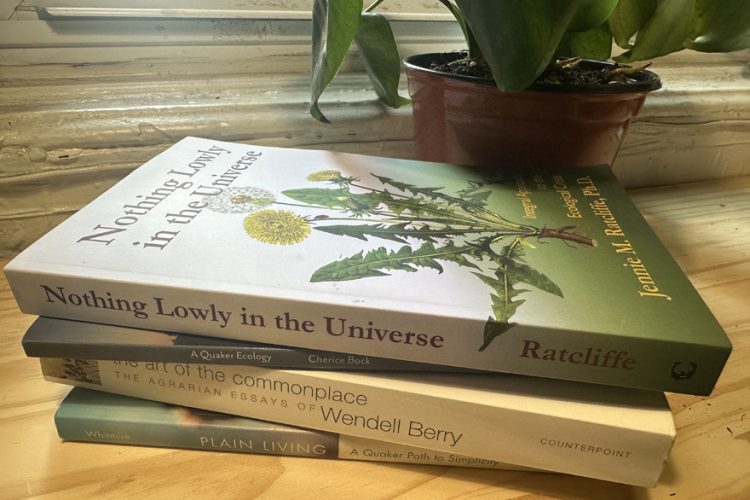Letting Your Life Speak: Quaker Earthcare Begins at Home!
Anthony Manousos and Jill Shook
In 2014 we decided to adopt some major new green initiatives in our home that would inspire our friends and neighbors to do likewise. In doing so, we followed the injunction of George Fox:
Be patterns, be examples in all countries, places, islands, nations wherever you come; that your carriage and life may preach among all sorts of people, and to them; then you will come to walk cheerfully over the world, answering that of God in every one.
In his essay “Plea for the Poor,” the 18th century Quaker prophet John Woolman noted that the seeds of war are sown in our lifestyles:
Oh! that we who declare against wars, and acknowledge our trust to be in God only, may walk in the light, and therein examine our foundation and motives in holding great estates! May we look upon our treasures, and the furniture of our houses, and the garments in which we array ourselves, and try whether the seeds of war have nourishment in these our possessions, or not. Holding treasures in the self-pleasing spirit is a strong plant, the fruit whereof ripens fast.
A day of outward distress is coming, and Divine love calls to prepare against it. Hearken then, O ye children who have known the light, and come forth. Leave every thing which Jesus Christ does not own. Think not his pattern too plain, too coarse for you. Think not a small portion in this life too little. But let us live in his spirit, and walk as he walked: so shall we be preserved in the greatest troubles.
Woolman was calling on his fellow Quakers, and fellow Christians, to simplify their lifestyles and not use products made by slave labor. He refused to wear clothes dyed with indigo harvested by slave labor; he wore conspicuous bleached white garments instead. He foresaw the bloody consequences of slavery.
Today we see the violent consequences of living in a society dependent on cheap oil and cheap, underpaid labor. Many of the products in our home are petroleum-based. Over-consumption of fossil fuels degrades the planet and heightens the risk of war. Our dependence on underpaid labor creates misery for millions of workers both here in the U.S. and around the world. To show our concern for these workers, and for the planet, we need to live more sustainably, in harmony with Divine Love. We can already see how petroleum addiction is creating dire consequences for life on this planet. The Congress may be in denial about climate change, but the military is realistic. The Pentagon is already making plans for wars they feel will be caused by shortages of water, oil, and other basic resources, calling climate change a “threat multiplier.”1
DIVINE LOVE CALLING
While we need to remain committed to lowering our military budget and work with FCNL and other organizations to reduce the threat of war, at the same time we need to look for the seeds of war in our own homes. To do this, we felt led to make our home an example of how to lower our carbon footprint and water use as much as possible. We decided to invest a good portion of our savings in making our home and lifestyle Earth-friendly. Some have called our investment a “sacrifice.” It has in fact taken a big financial commitment but we have not felt it has been a burden: most of our investments will be paid back in 10 years or less.
We did not make this “sacrifice” for financial reasons, however; we felt a leading of the Spirit. Sacrifice means “to make holy.” We see our home as a “holy experiment” (to use William Penn’s phrase for the colony of Pennsylvania)–a way to demonstrate our Quaker (and Christian) values in a joyful, life-affirming, God-honoring way.
By investing in smart technology, we have been able to reduce our carbon footprint significantly, perhaps as much as 80 percent. We installed solar panels that produce nearly 5500 KW hour per year, more than enough electricity for our home. And it’s more cost effective than you may think! We use the surplus watts to help run our Chevy Volt, which we bought used at nearly half price. It’s a plug-in hybrid that goes 40 miles on a charge, and then runs on an efficient engine that averages 85 miles per gallon! It drives beautifully and quietly, like a golf cart (or a Quaker meeting). Its state-of-the-art technology is made in Detroit, a struggling U.S. city, which is another reason we love it. It reduces our gas consumption by 75 percent. Instead of fracking and the Keystone XL Pipeline, we feel renewable energy is the best way to reduce dependence on foreign oil—one of the root causes of war today.
BLOSSOMING IN NEW WAYS
Another source of conflict locally and globally is lack of water. Due to our concern for the historic drought here in California—which some say is the worst in 1,200 years—we have taken numerous measures to reduce our water use.
We have taken advantage of the city’s turf removal program and replaced our grass with mulch, decomposed granite, and some drought-tolerant native and some Mediterranean plants. (Our permeable decomposed granite allows more water to percolate into the water table.)
The city paid us $2 per square foot to remove our lawn because (as the city website explains): “Turf grass is one of the most water-intensive plants in your landscape. Its high water use and frequent maintenance make it a time-consuming and expensive yard option. In fact, the average residential customer spends about 60 percent of their water on outdoor irrigation. By changing turf to a California Friendly™ yard of drought tolerant plants you can save water and money.”
We also save water and money through our graywater system. Thanks to our Latvian plumber, a former Olympian who thinks outside the box, we have installed a graywater system that recycles around 10,000-20,000 gallons of water per year from our bath tub and sinks to water our fruit trees. Because my wife has a keen sense of smell, we added pipes to vent the odor in this holy experiment.
We make our own environmentally and plant-friendly cleaning products using recipes with ingredients our grandparents would have used: vinegar, hydrogen peroxide, and Dr. Bonner’s soap that is free from salt. Our house cleaners can now advertise themselves as eco-friendly.
OVER ALL THE EARTH
One of the most joyful ways to reduce our carbon footprint is through gardening. We’ve enjoyed experimenting with various ways to make our garden productive and beautiful. We produce several hundred pounds of fruit and vegetables each year, but within a mile of our home an “urban homesteading” organization called Path to Freedom produces 6 tons of food on a plot not much bigger than ours! (See http://urbanhomestead.org/.) So we have a long way to go. We grow vegetables all year round in our raised bed organic garden. It has an underground self-cleaning drip system called Netaphim that saves water: no evaporation and few weeds!
We also have 19 fruit trees—several citrus, avocados, apple, kumquats, loquats, peaches, plums, persimmons, figs, passion fruit—and raspberry, blackberry, and concord grapes vines. The motto of our home is “Everyone ‘neath their vine and fig tree / shall live in peace and unafraid. /And into ploughshares turn their swords/ Nations shall learn war no more” (a song based on the prophet Micah, which we love to sing together).
BEING EXAMPLES
Neighborhood kids love to come to our home to see our interesting critters. In addition to ordinary composting, we practice vermiculture (our African red wrigglies produce excellent fertilizer on the par with Miracle Gro, and they delight the kids). Children also enjoy running after and cuddling our pampered chickens (up to 10 are allowed in the city of Pasadena). We use our chicken droppings to add a rich dose of nitrogen to the compost. And we celebrate Easter all year long, with pale pink, green, and blue eggs, natural colors of the Arucana/Amerucana breed.
Our yard has become a small plot of paradise and a joy for us as well as our neighbors. Our bird bath fountain recycles water and welcomes birds, and our milk weed attracts monarch butterflies. For my afternoon siesta/meditation, I love to lie on our hammock (made in Guatemala and purchased through Ten Thousand Villages) and contemplate the beauty of God’s miraculous creation. I feel as if I am in heaven! And I hope I’m setting a good example for our neighbors.
We have given many neighbors and friends tours of our home. We not only show them what we’ve done, we also tell them about government subsidies that have helped us transform our home and garden. Rebates for solar, electric cars, turf removal, etc. help make green living more affordable. We need to expand these subsidies and programs in order to transition to a sustainable economy. As FCNL demonstrates with its green architecture and office, lobbying efforts are more effective if we practice what we advocate. An article about our home’s green initiatives appeared in the Pasadena Star News with the title: “Looking out for others, being stewards of the planet.”2
Jill and I also love to share our holy experiment with the rising generation. In addition to neighborhood kids, I spoke about the green initiatives in our home to the kids at the First Day school at our meeting. I also invited my class from the Peace and Justice Academy to tour our home and learn about how to live sustainably. Kids love and get what we are doing. Fox told us to “walk cheerfully on the earth” and we are definitely cheerful about our green lifestyle. We love to tell our friends and neighbors. Come and visit: Nuestra casa es su casa! f


